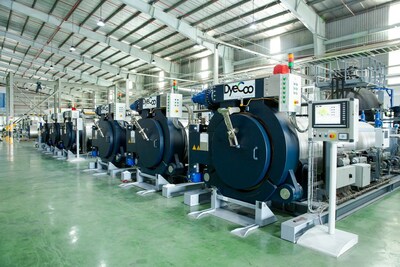
NEW YORK CITY — September 27, 2023 — DyeCoo’s waterless dyeing technology, operated by CleanDye’s factory in Vietnam, generated 58 percent lower greenhouse gas emissions than conventional textile dyeing vendors, an independent lifecycle assessment (LCA) commissioned by Adidas shows.
The LCA was commissioned as part of a program with Adidas to identify and certify low carbon textile coloration technologies.
As brands like Adidas reshape the apparel industry to address climate concerns, technologies such as DyeCoo’s supercritical CO2 dyeing that reduce both carbon emissions and water pollution are essential for sustainable fashion. Based on these results, Adidas will be incorporating CO2 dyeing into its supply chain.
The LCA was conducted by Sphera, a third-party consultant with a proven track record of producing reliable sustainability reports across several industries. Sphera compared CleanDye and DyeCoo’s waterless dyeing process to three of Adidas’ conventional fabric vendors and found that CleanDye and DyeCoo generated a 58 percent smaller carbon footprint versus conventional fabric dyeing technology.
This report coincides with increasing interest in DyeCoo’s technology from firms all over the world, including manufacturers in Turkey, Vietnam, India, Bangladesh, and Central America and large international brands and retailers that seek to reduce their carbon footprint over the coming years. DyeCoo received enthusiastic feedback at ITMA — the world’s largest international textile and garment technology exhibition, which was held in Italy in June. During the exhibition, DyeCoo introduced a range of new CO₂ dyeing solutions, including a smaller fully electric CO₂ dyeing machine suitable for sampling and small-scale production, as well as an advanced lab system for R&D purposes.
“We are thrilled about this report — and that CO₂ dyeing is gaining momentum in textile manufacturing,” said Kasper Nossent, commercial director at DyeCoo. “We look forward to expanding our technology beyond our current customers to other factories around the world in collaboration with our brand partners.”
Besides the significant sustainable impact, DyeCoo’s CO₂ dyeing technology also provides a full color gamut and a very high batch-to-batch consistency in bulk production, without compromising on quality and cost.
Simon Weston, CleanDye’s CEO, said, “The LCA is also a testament to our Vietnam facility, where we use DyeCoo technology to deliver high-quality, sustainably manufactured fabric at competitive prices.”
CleanDye has already produced fabrics for brands such as Decathlon, Tom Tailor, s.Oliver, Marco Polo, and Bonprix, and many other global apparel and footwear brands are in discussions to incorporate DyeCoo and CleanDye into their supply chains.
“After analyzing the LCA, CleanDye has made further improvements to our process, and we are confident that our carbon emissions are even lower than the already impressive LCA figures,” added Weston.
“We already knew that CO₂ dyeing technology dramatically reduces water pollution from textile manufacturing,” said Kenneth Katz, managing director & head of Asia at TAU Investment Management, a New York City- and Hong Kong-based private equity firm that holds a controlling interest in CleanDye and a significant interest in DyeCoo. “Innovation like this is critical. Twenty percent of industrial water waste comes from textile dyeing. But this report is especially exciting since it demonstrates that DyeCoo’s patented technology and CleanDye’s purpose-built dyeing facility in Vietnam also dramatically reduce carbon emissions.
“We look forward to expanding the impact of DyeCoo and CleanDye’s innovation in the sustainable transformation of the fashion industry,” Katz said.
Posted: October 9, 2023
Source: CleanDye Vietnam Co. Ltd.
